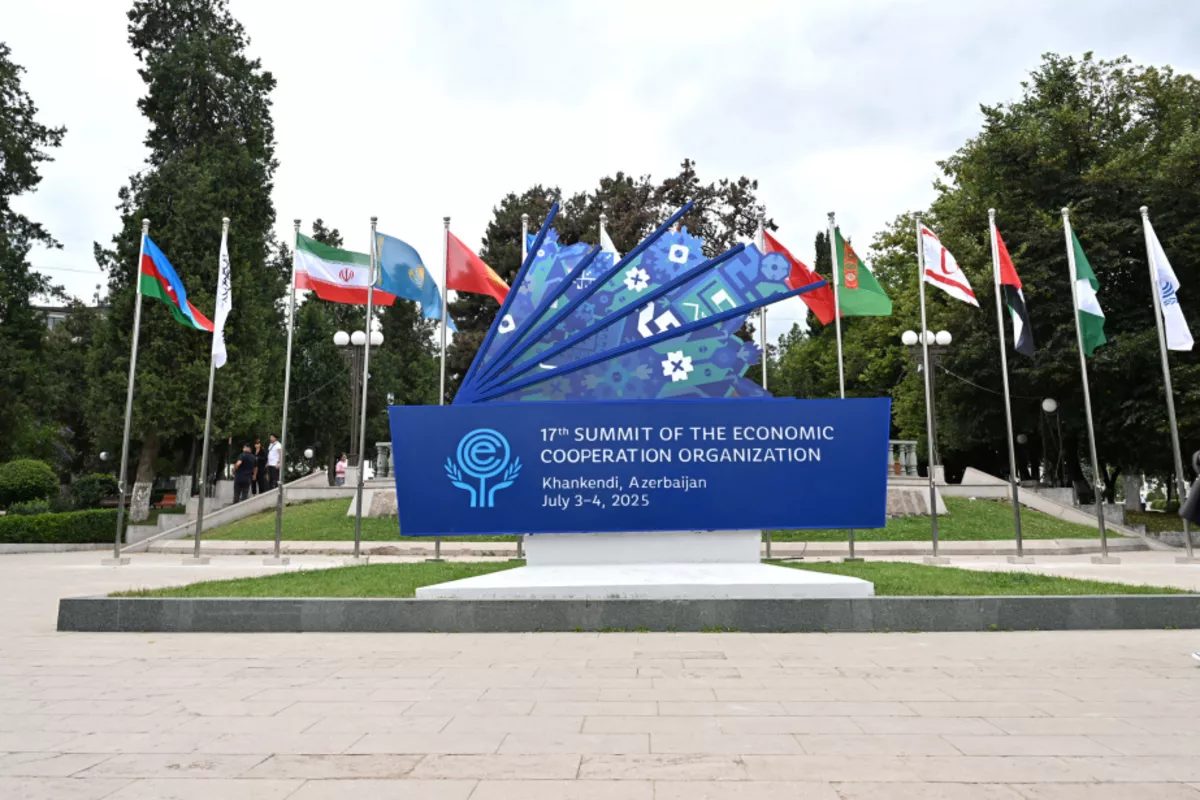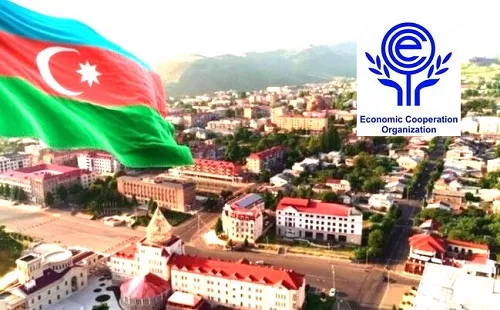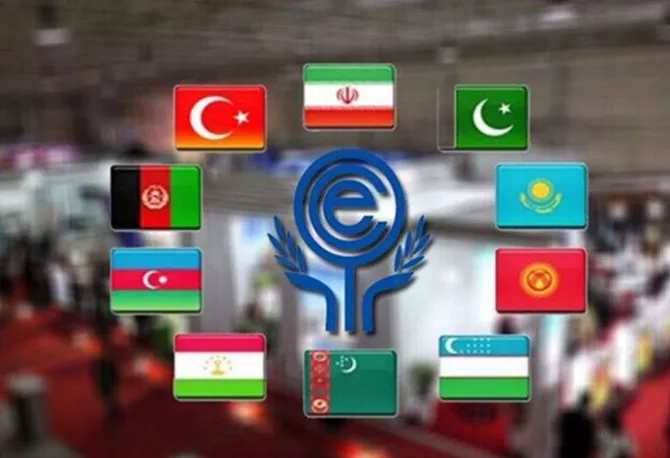
Photo: AZERTAC
The 17th Summit of the Economic Cooperation Organization (ECO) has officially commenced in Khankendi. This marks the third time Azerbaijan has hosted a high-level ECO meeting, underscoring both the importance of the organization to Azerbaijan and the country’s growing authority within the ECO space.
Heads of state and government, ministers, observers, specially invited guests from non-member countries, and representatives of international organizations have arrived in Khankendi to participate in the summit. Discussions will cover pressing regional and global economic issues, with the aim of shaping collective responses and joint decisions.
Notably, the summit in Khankendi is not limited to the meeting of heads of state. It is part of a broader event - ECO Week - which includes the Youth Forum held on July 1 in Aghdam, the Women’s Forum on July 2 in Lachin, and the 6th ECO Business Forum that took place in Fuzuli on the same day. This expanded format was initiated by the Azerbaijani government, as highlighted in remarks to the media by ECO Secretary General Khusrav Noziri.
The ECO unites 10 countries from South and Central Asia and the Middle East, comprising a vast collective economic and demographic potential.
The organization was established in 1985 by countries in Central Asia and the Middle East as the successor to the Regional Cooperation for Development (RCD), which was originally founded under the Treaty of Izmir on March 12, 1977, by Iran, Pakistan, and Türkiye. Until 1992, ECO cooperation was mostly bilateral in nature. Following the accession of seven new members in 1992 - Kazakhstan, Azerbaijan, Afghanistan, Kyrgyzstan, Tajikistan, Turkmenistan, and Uzbekistan - the organization significantly expanded its scope and ambition.
In 1995, the 50th session of the UN General Assembly adopted a resolution on cooperation with ECO, granting the organization observer status. ECO also holds observer status at the Organization of Islamic Cooperation (OIC).
At its core, ECO is driven by economic interests. Its member states possess significant demographic and economic capabilities.

photo: Pakistan in the World
Azerbaijan has become an indispensable member of the organization. In recent years, the country has significantly strengthened its role as a regional transport and energy hub - a strategic intersection for the continent’s major logistical corridors. Moreover, Azerbaijan is emerging as a regional political center, attracting partners through its stability and predictability.
As President Ilham Aliyev noted at the previous ECO Summit in Tashkent:
“Azerbaijan’s transport and logistics infrastructure is open to ECO member states. In recent years, Azerbaijan has invested billions of U.S. dollars into its transport sector and has become one of the leading logistical hubs along the East-West and North-South corridors of Eurasia. The segments of both corridors that pass through Azerbaijan are fully operational. We are now working to expand the throughput capacity of these railway lines.”
Among the key infrastructure projects available to ECO partners are the Baku-Tbilisi-Kars railway, the Southern Gas Corridor, the Baku-Tbilisi-Ceyhan oil pipeline, the Alat International Sea Trade Port, and a modern highway network that ensures efficient freight transportation. As a pivotal country on the Middle Corridor, Azerbaijan is well-positioned to provide seamless and reliable transit for goods and vehicles to all ECO partners and those seeking deeper engagement with the ECO region.
Not only Azerbaijan’s traditional partners, but also Afghanistan is actively involved in ECO-linked projects. A key example is the Lapis Lazuli corridor, which begins in Afghanistan’s Herat province and traverses Turkmenistan, Azerbaijan, Georgia, and Türkiye.

Photo: AZERTAC
Green energy cooperation also plays a crucial role in ECO’s current agenda. During the Khankendi summit, the ECO Clean Energy Center is expected to be officially launched.
In February, the Azerbaijani Parliament ratified the Charter of the ECO Clean Energy Center (CECECO), which will be headquartered in Baku. The Center was established as part of COP29 in partnership with ECO and the United Nations Industrial Development Organization (UNIDO). As emphasized by officials, this initiative carries strategic importance not only for Azerbaijan but for all ECO member states.
The ECO Clean Energy Center will serve as a regional institution focused on advancing renewable energy, improving energy efficiency, ensuring energy security, and mitigating the impacts of climate change among member states. It will operate through thematic divisions, covering areas such as renewable energy, climate change, capacity building, research and development, and financing.
Earlier, in 2023, Azerbaijan, Türkiye, and Pakistan signed a charter establishing the ECO Research Center in Baku. This initiative was first proposed by Azerbaijan in the Baku Declaration adopted at the 9th ECO Summit in May 2006 and has since gained momentum in subsequent meetings.
A key indicator of Azerbaijan’s effective cooperation with ECO countries is the growth in trade volume. Between January and May of this year, trade turnover between Azerbaijan and ECO member states reached $3.547 billion, increasing by over $300 million, or more than 10%. Notably, exports of non-oil products from Azerbaijan to ECO countries have grown significantly.
Azerbaijan remains strongly committed to expanding its cooperation within the ECO framework. Baku welcomes any integrative format grounded in shared economic interests.
As ECO Secretary General Khusrav Noziri stated during the business forum in Shusha on June 2, a Memorandum of Understanding on trade facilitation among ECO member states is ready for signing. According to him, a more structured and collaborative approach is expected to enhance market visibility and foster commercial links across the region. Additionally, a memorandum aimed at enhancing legal cooperation between ECO customs authorities is also prepared for signing.
These documents may be formally signed during the Khankendi summit. This gathering promises to be especially significant given the ongoing geopolitical shifts across the continent. ECO’s strength lies in its ability to unite countries with balanced, mutually beneficial relations that are not subject to political erosion. These countries are genuinely interested in one another and in building a stable shared space - because without stability, economic development is impossible.
By Tyral Heybatov
Share on social media